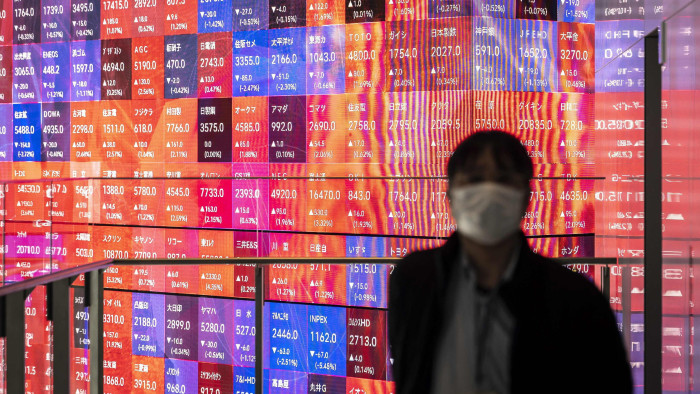Active ETFs set to debut in Japan next year

Simply sign up to the Exchange traded funds myFT Digest -- delivered directly to your inbox.
Latest news on ETFs
Visit our ETF Hub to find out more and to explore our in-depth data and comparison tools
Actively managed exchange traded funds are expected to debut in Japan next year, as the country attempts to reignite interest from investors who have had access to passive ETFs for more than two decades.
The Tokyo Stock Exchange will modify a current rule that only permits index-linked ETFs and will allow active ETFs from the middle of next year, an official at the exchange said.
Japan-listed active ETFs will be subject to daily basket disclosures and inverse active funds will be banned. Final regulations are to be released sometime between March and April next year.
While hundreds of institutions and ETF providers have been communicating with the exchange about active ETFs, not all managers are confident that the products will receive an immediate positive reception from Japanese investors, who are traditionally conservative.

This article was previously published by Ignites Asia, a title owned by the FT Group.
Daiwa Asset Management is aiming to be one of the first to roll out active ETFs. It is considering not only active equities and bond ETFs, but also balanced and multi-asset strategies.
Masahiro Hotchi, the firm’s Tokyo-based ETF business development manager, said he expected the first active ETFs in Japan to be met with a “quiet” response.
Active ETFs will be hampered by the fact that, unlike mutual funds, ETFs do not have a subscription period during which firms can attract investors, so the first promotion happens after an ETF is listed, he said.
Hotchi said he expected active ETFs to “grow gradually” with “very big” potential.
In markets such as the US, active ETFs have experienced rapid growth, partly propelled by the success of Cathie Wood’s ARK Innovation ETF (ARKK), which delivered returns of more than 150 per cent in 2020 before suffering a disappointing performance in 2021. It was down more than 55 per cent in the eight months to August 31, according to VettaFi.
Globally, active ETF assets reached a record high of $474bn in July, up 5.3 per cent from $450bn in the previous month, according to data provider ETFGI.
In the Asia-Pacific region, exchanges in South Korea, Australia and Hong Kong are ahead of Japan in promoting active ETFs to local investors.
Some market participants believe the Japanese market is not yet ready for active ETFs.
Jooyoung Yun, chief investment officer at Global X Japan, said that although active ETFs are another way to provide new product solutions to investors, Japan’s ETF space had not yet matured compared with other developed markets.
Based on his evaluation of the current state of the ETF market in Japan, Yun said it would take time for investors to become familiar with active ETFs.
“Investors can be confused with the difference between passive ETFs and active ETFs when they choose their optimal product solution,” Yun said.
“The appropriate regulatory framework should be well prepared and sufficient education should be provided.”
There were nearly 240 funds on the Tokyo Stock Exchange, with about $466.3bn in AUM as of early August, according to Morningstar data. Largely due to the weaker yen, the recent AUM marked a steep drop from a year earlier, when the 210 ETFs listed had $549.7bn in assets.
Japan’s ETF holdings by retail investors and foreign investors have increased in the past decade.
Individual investors held ¥1.3tn ($9.26bn) worth of ETFs in July 2021, up nearly 250 per cent from ¥364bn in July 2012, according to the most recent Tokyo Stock Exchange data. ETF assets held by overseas investors recorded a 310 per cent increase from ¥290bn to ¥1.2tn over the same period.
Institutional investors remain the dominant players in Japan’s ETF market. Most notably, at the end of July, the Bank of Japan owned 63 per cent of locally listed ETF assets.
Kei Okazaki, head of ETF secondary trading at the Tokyo Stock Exchange, was confident there would be demand for active ETFs after the exchange contacted about 700 institutional investors nationwide, mainly financial institutions, to gauge interest in the new product.
“The needs for [active] ETFs that have emerged from interviews with investors and managers are particularly strong in the bond, multi-asset and ESG fields,” Okazaki said.
New asset managers have particularly expressed interest in active ETFs as it is difficult to outcompete traditional players with passive funds, he added.
Osamu Okuyama, managing director of the ETF business department at Nomura Asset Management, also thought that Japanese investors’ perception of ETFs was changing.
“In the past, many Japanese investors thought ETFs equalled Japanese equity. However, recently, investors’ perception is gradually changing, and they are finding that ETFs are a good investment tool,” Okuyama said.
Adding active ETFs, which tend to be cheaper and more transparent than their mutual fund counterparts, to the line-up of financial products could lure Japanese retail investors, said Jesper Koll, executive director of Monex Group.
“The bigger the choice, the greater the likelihood that Mr And Ms Watanabe [the typical retail investors] are actually going to come to the fore,” he said.
*Ignites Asia is a news service published by FT Specialist for professionals working in the asset management industry. It covers everything from new product launches to regulations and industry trends. Trials and subscriptions are available at ignitesasia.com.
Latest news on ETFs
Visit our ETF Hub to find out more and to explore our in-depth data and comparison tools

Comments